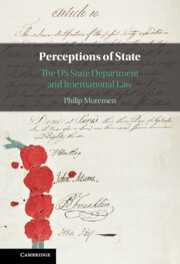Book contents
- Perceptions of State
- Perceptions of State
- Copyright page
- Contents
- Tables
- Preface and Acknowledgments
- 1 Introduction
- 2 Background Literature
- 3 State Compliance with International Law
- 4 Compliance by the United States
- 5 The Role of International Law in State Department Policymaking
- 6 The Trump Administration and International Law in the State Department
- 7 Conclusion
- Appendix Interview Subjects
- Index
4 - Compliance by the United States
Published online by Cambridge University Press: 07 June 2024
- Perceptions of State
- Perceptions of State
- Copyright page
- Contents
- Tables
- Preface and Acknowledgments
- 1 Introduction
- 2 Background Literature
- 3 State Compliance with International Law
- 4 Compliance by the United States
- 5 The Role of International Law in State Department Policymaking
- 6 The Trump Administration and International Law in the State Department
- 7 Conclusion
- Appendix Interview Subjects
- Index
Summary
Chapter Four focuses on US compliance with international law. The perception of former officials was that US compliance with international law was robust. When asked about the reasons that the United States complies or does not comply with international law, the former officials’ responses tracked many of the factors they listed for states in general. The chapter then explores the interplay between law and policy, exploring how policymakers balance these competing concerns. Former officials were clear that while international law was generally followed, it was not always dispositive. Legal issues were considered as one factor among a variety of factors, essentially involving a cost–benefit analysis. The salient considerations driving compliance or noncompliance, as revealed in the interviews, appeared to be the nature of the national interest or policy at stake; the nature and significance of the international legal rule involved ethical considerations; the views of allies; the ambiguity or precision of the legal obligation; and the weight of domestic political and bureaucratic concerns. The chapter next examines factors that may affect policymaker perceptions, including party affiliation, and concludes with a description of instances where the United States either bent international law or complied scrupulously.
Keywords
- Type
- Chapter
- Information
- Perceptions of StateThe US State Department and International Law, pp. 104 - 154Publisher: Cambridge University PressPrint publication year: 2024

